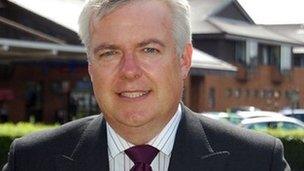UK and EU: Carwyn Jones concern over referendum pledge
- Published

Carwyn Jones says the EU referendum pledge is an unwelcome distraction
Uncertainty over Wales' EU membership will create years of instability, First Minister Carwyn Jones warned as David Cameron pledged an in/out referendum.
Mr Jones called it "an unwelcome distraction" that could hit jobs.
He spoke after the prime minister said a referendum will be held should the Conservatives win the next election.
Lib Dems also queried the uncertainty, but Tories attacked Welsh Labour's economic record, and Plaid Cymru cited the European Union's benefits to Wales.
Mr Cameron said he wanted to renegotiate the UK's relationship with the EU, before giving a vote by the end of 2017 at the latest on accepting the result of the talks or leaving the union.
Wales' ability to "influence and shape EU policies" will be hindered in the intervening years, according to the first minister.
Responding to the prime minister's long-awaited speech, Mr Jones said: "Uncertainty over our membership will create years of instability and marginalisation just at the time when both Wales and the UK need stability, growth and influence.
"Such an uncertain future for the UK in Europe could put a brake on potential inward investors."
The Welsh Liberal Democrats agreed that the prime minister should "be wary of the effect announcements like this have on business confidence in Britain."
Aled Roberts, the party's North Wales AM said: "This will have eased tensions within his party in the short-term, but it does raise questions as to whether this whole uncertainty over the next 4-5 years is the best thing for Britain."
'Appalling record'
Andrew RT Davies, leader of the Conservatives in the assembly, said his party would "take no lectures" from the first minister.
Mr Davies said: "It's a bit rich for the Labour leader to say that a referendum on our nation's future would be a distraction, when he has made a political career out of distracting attention from his government's appalling record of economic failure.
"Under Labour leadership, Wales is the poorest part of the UK, the least attractive UK nation or region for inward investment and is propping up European league tables in health and education standards."
The prime minister - who pledged to campaign "heart and soul" to stay within the EU - said it would be a decision on the UK's "destiny".
But Mr Jones said the speech would have unwelcome "constitutional repercussions for the UK itself" and "plays into the hands of those who want to break up the United Kingdom".
The first minister added that it "will have a destabilising effect on the future of the United Kingdom at a time when we can ill-afford it."
Plaid Cymru said the benefits to Wales from EU membership were being put at risk by "the other parties playing political games".
'Absolutely no guarantee'
Plaid pointed to a recently published party report which showed that Wales benefits by an average £40 a year per person from various sources of EU funding.
Plaid MEP Jill Evans said: "We in Wales need EU funding to strengthen our economy, develop our infrastructure and create much needed jobs in our poorest areas.
"Losing that support would be a major step backwards. Central to Wales' future is a positive and productive partnership with a European Union that provides support to its poorest areas."
Mr Cameron's announcement was welcomed by Eurosceptics who have long campaigned for a vote.
But the UK Independence Party (UKIP), whose poll ratings have been rising, questioned the likelihood of a referendum actually going ahead.
UKIP Wales MEP John Bufton said: "There is absolutely no guarantee that a referendum will happen at all. Whilst Prime Minister Cameron is talking about this now, it's at least five years down the line.
"I think people need to be absolutely clear here, that all Cameron is doing is kicking the can down the road."
Mr Bufton called on the prime minister to have the "guts" to hold a referendum before the next general election.
- Published23 January 2013
- Published23 January 2013
- Published23 January 2013